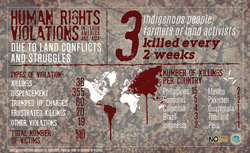3 Indigenous People, Farmers or Land Activists Killed Every 2 Weeks Due to Land Conflicts and Struggles

Victims are mostly indigenous peoples (461 victims or 90% of the total) while the remaining are land activists, community leaders, farmers and agricultural workers.
From January to June 2015, there have been about 56 cases of human rights violations related to land conflicts and struggles in Asia and Latin America, with around 510 victims. The victims are mostly indigenous peoples (461 victims or 90% of the total) while the remaining are land activists/community leaders and farmers and agricultural workers.
The data are from the Land & Rights Watch (LR Watch), the latest initiative of PAN Asia Pacific (PANAP) to closely monitor and expose human rights abuses against communities opposing land and resource grabbing.
Of the total number of cases, 31 are killings that claimed 36 victims while 6 cases are frustrated killings with 20 victims.
This means that 6 are killed every month – or three every two weeks – among members of indigenous and farming communities as well land activists in Asia and Latin America – in the context of land struggles and conflicts in the first half of 2015.
Most of the killings happened in the Philippines with 15 victims, followed by Honduras (5 victims); Colombia (4); Brazil (3); Indonesia, Pakistan and Mexico (2 each); Thailand Guatemala, and Peru (1 each).
Other common cases are threats and harassment (5 cases, 5 victims); arbitrary arrest and detention (4 cases, 9 victims); and trumped up charges (4 cases, 80 victims).
Overall, most of the human rights violations happened in the Philippines where 21 cases and 384 victims have been monitored. Honduras came in second with 13 cases and 90 victims.
Majority of the human rights abuses happened in the context of military operations, particularly in the southernmost Philippine island of Mindanao. PANAP has recently issued an appeal to stop the intensifying human rights abuses in Mindanao against the indigenous communities there, most of whom are resisting mining, logging, plantation and other agribusiness operations that threaten their ancestral lands and livelihood. (Read the statement here.)
The LR Watch is part of the No Land, No Life!! Campaign, which PANAP and its partners launched early this year to highlight the human rights atrocities related to the struggles of local communities against land and resource grabbing. (Read more about the campaign here.)
For its monitoring work, PANAP culls data and information from online news and articles and reports from its networks and partners. Thus, the LR Watch does not claim to represent the true extent of human rights violations that are related to land and resource grabbing and similar conflicts in the rural areas. However, the compiled data help provide a glimpse of the alarming state of human rights confronted by indigenous peoples, farmers, farmworkers and others in the rural communities that are defending their right to land and resources.
Reference: Ms. Sarojeni Rengam, PANAP Executive Director, [email protected]

